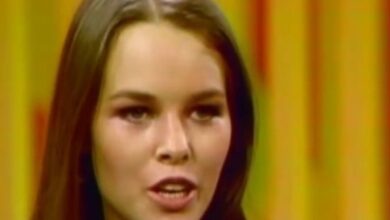Elvis Presley’s ‘Burning Love’ Sparks a Fiery Rock & Roll Comeback in 1972
Elvis Presley’s 1972 single Burning Love became one of the defining moments of his later career, standing as his last major rock hit to make a serious impact on the charts. Released on August 1, 1972, it shot up the Billboard Hot 100, peaking at number two. In an era when rock had changed dramatically since his early days, Burning Love proved Presley could still seize the spotlight with his electrifying presence and unmistakable voice.
By the early ’70s, Presley was already a towering figure in music history, having reshaped popular culture with his fusion of rhythm and blues, gospel, and country. His career had shifted through many phases—from the raw rockabilly fire of the 1950s to a decade dominated by Hollywood films in the ’60s. By then, he was closely associated with glittering Las Vegas shows and grand ballads, leaving many to wonder if he would ever return to the unrestrained rock & roll energy that had first made him a household name.
That answer came with Burning Love, written by Dennis Linde. Known for crafting catchy songs infused with Southern rock flavor, Linde had originally recorded it himself. But once Presley took it on, the track transformed into a blazing, rhythm-charged anthem of passion. Its feverish lyrics paired perfectly with Presley’s urgent delivery, creating a performance that radiated both heat and charisma.
The recording took place on March 28, 1972, at RCA Studios in Hollywood, with longtime producer Felton Jarvis at the helm. Presley was joined by an all-star lineup, including James Burton’s searing lead guitar, Glen D. Hardin’s driving piano, and Ronnie Tutt’s powerhouse drumming. Linde himself played rhythm guitar, ensuring a trace of the original stayed in the mix. The result was a tightly arranged, high-energy track that echoed the spirit of Presley’s earliest rock hits.
Upon its release, Burning Love received an immediate wave of enthusiasm. It became Presley’s biggest rock single in years, restoring his presence on the pop charts at a time when Led Zeppelin, The Rolling Stones, and Elton John were dominating the scene. Although it narrowly missed topping the Billboard Hot 100, its number-two position cemented his relevance in a rapidly changing musical era. The single’s crossover appeal was also evident in its success on the country charts.
More than a chart triumph, Burning Love reintroduced the high-voltage rock style that had made Presley famous. In sharp contrast to his elaborate Vegas ballads, this song was a nod to the hip-shaking, high-energy performances that once shocked and thrilled audiences. It was proof that, no matter how rock music evolved, Presley could still deliver a performance that demanded attention.
The song’s success sparked a renewed excitement around Elvis as a rock performer. While he would continue recording and performing prolifically, Burning Love was one of his last major rock hits before his passing in 1977. On stage, it became a crowd favorite, delivered with the kind of energy and showmanship that kept audiences enthralled.
Over the years, Burning Love has been embraced by artists across genres—covered by country stars, rock bands, and even alternative acts—showing its enduring versatility. Its driving beat and soaring vocal lines have kept it alive in popular culture long after its original release.
One of the most celebrated live versions came during Presley’s Aloha from Hawaii concert in 1973, broadcast via satellite to millions worldwide. Wearing his iconic white jumpsuit, Elvis tore through the song with commanding energy, creating one of the most thrilling moments of his later career.
Decades later, Burning Love remains a staple in Presley retrospectives and greatest hits collections. Its placement in films, TV shows, and commercials continues to keep it in the public ear. The song captures everything that made Elvis unforgettable—energy, passion, and a voice that could ignite any stage.
As the final great rock anthem of his career, Burning Love is a testament to why Elvis Presley will always be known as the King of Rock & Roll. With its irresistible rhythm, memorable melody, and powerhouse vocals, it stands as living proof that even in a new era, his fire still burned just as brightly as ever.





